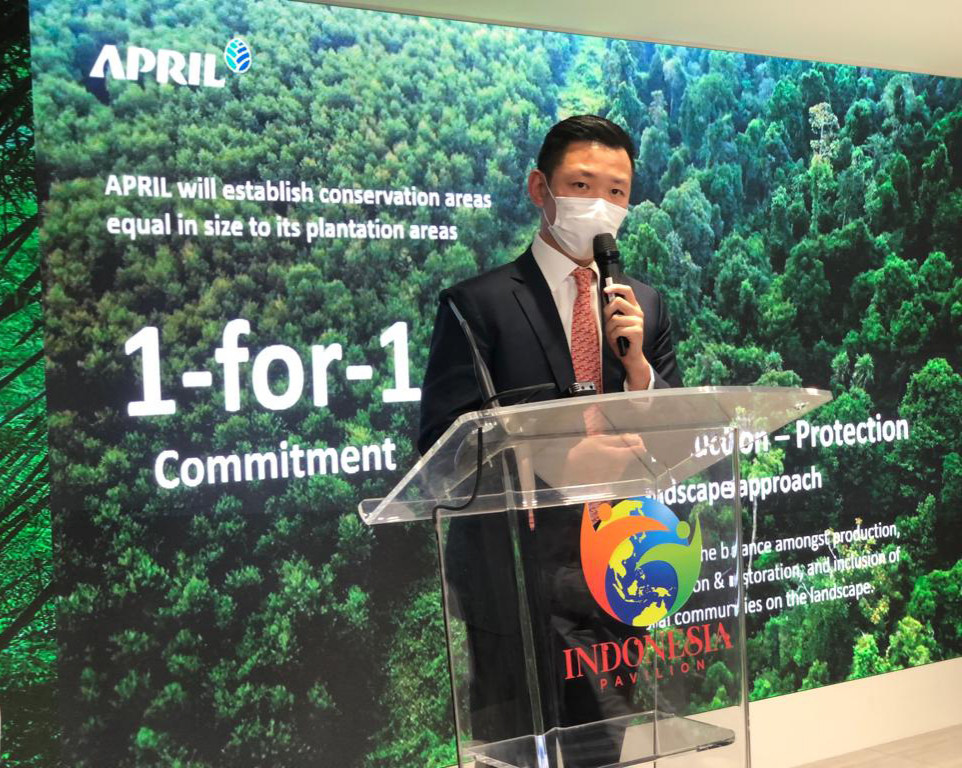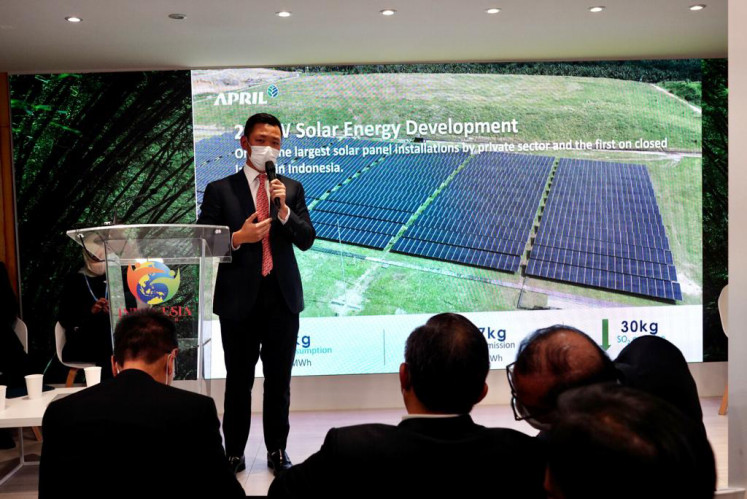Public, private sector collaboration essential to fund, implement climate goals
Finance Minister Sri Mulyani said in a recent dialogue with Asia House that Indonesia would need at least $5.7 billion every year to fund its green energy transition.
Change Size
 (Courtesy of April Group)
(Courtesy of April Group)
A
t the 26th United Nations Climate Change Conference (COP26) in Glasgow, Scotland, this week, a major focus for the heads of state, scientists and business leaders in attendance is how different groups of stakeholders can collaborate to fund and implement the ambitious emissions reductions targets that will need to be achieved in the coming decades to address climate change.
Globally, the United Nations Environment Program (UNEP) has estimated that it will require at least US$100 billion for climate finance. Finance Minister Sri Mulyani said in a recent dialogue with Asia House that Indonesia would need at least $5.7 billion every year to fund its green energy transition.
The Environment and Forestry Ministry held a discussion at COP26 on Monday featuring a number of prominent business leaders that focused on how businesses can lead the drive toward a more green, sustainable economy.
Titled Becoming the World’s Leader in Green Economy: Leading in NDC Implementation, the session was headlined by Alue Dohong, Indonesia’s environment and forestry deputy minister, and attended by business leaders from Pertamina, Royal Golden Eagle and the Indonesian Chambers of Commerce and Industry (Kadin), among others.
The deputy minister said in his keynote address that Indonesia’s Nationally Determined Contribution(NDC) targets included a reduction in greenhouse gas (GHG) emissions by 29 percent independently or 41 percent with international assistance by 2030.
“To achieve the GHG emissions reduction target, Indonesia realizes that support from all stakeholders is very important, particularly from the private sector and state-owned companies,” he said.
He highlighted a UNEP Green Economy Report that said the implementation of green economy concepts “must take place effectively and fairly, assuring a just transition to low-carbon, resource efficient and socially inclusive economies”.
“The role of the private sector should include addressing the adaptation of vulnerable communities and contributing to planning the development and implementation of climate adaptation strategy through sector-specific expertise through financing, technology efficiency and entrepreneurship,” he said.
Anderson Tanoto, managing director of Royal Golden Eagle, which manages a resource-based group of companies, spoke about how APRIL Group had invested heavily in recent years to support climate mitigation and sustainable development. APRIL launched its APRIL2030 commitments and targets last year, which include a significant focus on addressing climate change and emissions reduction.

By 2030, APRIL Group aims to achieve net-zero carbon emissions from land use and reduce the intensity of carbon production by up to 25 percent. It has also committed to the zero-loss of protected forest areas across its operations in Riau province.
“With APRIL2030, we are building on the commitments embedded in our Sustainable Forest Management Policy 2.0 and on the progress we have made in implementing our sustainability strategy over the last five years. One key aspect of this strategy will be solar energy. We have already begun installing solar panels at our operations in Sumatra. Once completed in 2025, this will be one of the largest solar panel installations by a member of the private sector in Indonesia,” he said.
Another key element of addressing climate change is forest protection and restoration. Anderson highlighted the impact of APRIL Group’s forest ecosystem restoration program, Restorasi Ekosistem Riau (RER), which is made up of approximately 150,000 hectares of peatland forest on the east coast of Sumatra, an area about the size of London.
“Biodiversity is absolutely critical. We cannot only look at carbon without biodiversity and biodiversity without carbon. These two elements have to come hand in hand. We believe the RER
restoration project combines these two elements,” he said.
APRIL Group is also supporting the Environment and Forestry Ministry in developing a modern nursery in Rumpin, Bogor, West Java, close to Jakarta. Once fully operational, the nursery will provide 12 million seedlings for Indonesia’s national reforestation and restoration efforts, particularly in disaster-prone areas.
APRIL is working with the government through a public-private partnership (PPP) in which the company provides its knowledge in managing a large-scale modern nursery, similar to its facility in Sumatra, which was visited by President Joko “Jokowi” Widodo in Riau last year.
“We hope this PPP can be the beginning of many other partnerships with the government, not just for APRIL but for other private sector operators also,” said Anderson.
The session also showcased how the private sector is preparing for the challenges and opportunities that may arise from climate change.
“With the strong collaboration between the public and private sectors, and of course international parties, we can build a resilient green economy for the future of Indonesia,” said Arsjad Rasjid, chairman of Kadin.
Sustainable economic development in Indonesia could result in potential value creation of up to $250 billion in some areas, such as bio-economy, renewable power and waste management, he added.
This article is joint collaboration with The Jakarta Post and April Group.









